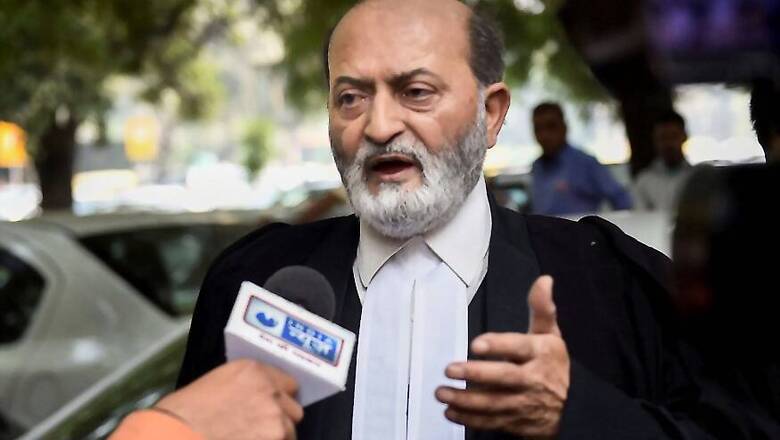
views
Zafaryab Jilani is now a man at peace. The very thought that the hearing in the decades-old Ram Janmabhoomi-Babri Masjid land dispute case is finally over, with the verdict to be delivered next month, makes him relieved and nostalgic.
With the Supreme Court conducting daily hearings in the matter since August 6, the senior advocate had mostly been in Delhi. On October 12, during the Dussehra vacations, News18 caught up with the man who spent 45 years of his life relentlessly pursuing the case for Babri Masjid.
“The judgment at this stage of life is not just a matter of my personal satisfaction,” said Jilani, who was representing Muslim parties in the case. “I am more relieved because not many are so aware of voluminous information, legalities and minutest of details involving the case. For anyone else to pick up the threads of the proceedings in the case spanning over decades will be a mammoth challenge after me.”
Barely two hundred metres from the Uttar Pradesh chief minister’s office, at the imposing Lok Bhawan building in Lucknow, is located Jilani’s legal chambers that for years has been sought after by journalists willing to understand and catch up with the developments in the legal battle of the Ayodhya title suit.
The senior advocate had been representing the Sunni Central Waqf Board and other Muslim litigants in the case. Over the years, he also emerged as eyes and ears to the case for the All India Muslim Personal Law Board (AIMPLB).
For advocate Jilani, it all started in 1975, when certain petitions related to receivership of the disputed site were filed with the Allahabad high court. After completing his studies from Aligarh Muslim University, Jilani had by then started practice in his home town of Lucknow. “Some senior members of the Awadh Bar Association at the Lucknow bench of the high court felt that jurisdiction of cases from Faizabad were with the bench at Lucknow and not the main bench in Allahabad,” he recalled.
This led to the Awadh Bar Association filing a petition with the high court. Jilani was one of the signatories. Ultimately, the matter was transferred to the Lucknow bench in 1977. However, even after this, there wasn’t much attention on the case. “I myself was not aware that the matter got listed regularly and my name was on the list,” he said.
It was the late 1970s, when the Ram temple movement had not yet gained traction. And the Ram Janmabhoomi-Babri Masjid dispute was still a few years away from becoming a defining religiopolitical controversy in contemporary India.
It was in 1983, after the Vishva Hindu Parishad carried out a Rath Yatra in favour of Ram Mandir, that some on the Muslim side started preparing to put up a challenge. “A few others and I, after being directed by the Muslim personal law board, got down to preparing notes from history books, Baburnama and other available resources,” he said. “A 12-page note on the matter was prepared and was first circulated among the board members, to give them an idea about the evolution of Babri mosque, and historical and legal aspects related to it.”
In February 1986, following the Faizabad district judge’s order to open the locks on the mosque, the Babri Masjid Action Committee was formed with the intent to start a campaign in support of the shrine and take on the rising wave of Hindutva. Jilani became the convener of the committee.
Since then, Jilani’s has been a life dedicated entirely to the cause of Babri Masjid. The mosque was demolished on December 6, 1992 by a mob of right-wing activists, amid allegations of larger conspiracies being hatched by the-then Kalyan Singh-led BJP government in the state and “suspicious silence” of the Congress government at the Centre. It also triggered a role reversal for Jilani. The advocate, who had been more of an activist in the pre-demolition era, spent most of his time in the black robes after it.
Jilani has no regrets about having dedicated so much time to the case, which may have been rewarding in terms of name and fame, but surely came at the cost of bigger prospects of a profitable practice. So what are his plans for the future?
“Life will not be the same as before,” he admitted. “I plan to focus more on my practice. My first priority will be those cases that have been pending on my table over the past few months as the Supreme Court went into day-to-day hearing of the Ayodhya title dispute.”




















Comments
0 comment